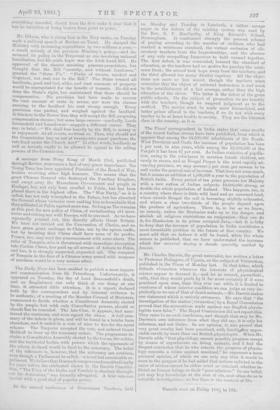The Daily News has been enabled to publish a most
import- ant communication from St. Petersburg. Unfortunately, it appeared on Tuesday, the day of Lord Beaconsfield's death, and as Englishmen can only think of one thing at one time, it attracted little attention. It is a report, declared both by the correspondent and by internal evidence to be authentic, of a meeting of the Russian Council of Ministers, summoned to decide whether a Constituent Assembly elected by the people, but with only Consultative powers, should or should t ot be conceded. The late .Czar, it appears, had sanc- tioned the summons, and even signed the ukase. A full sum- mary of the debate is given, and will be found in a briefer form elsewhere, and it ended in a vote of nine to five for the novel scheme. The Emperor accepted the vote, and ordered Count Melikoff to draw up the necessary orders. The programme in- cludes a Consultative Assembly elected by the towns, the nobles, and the territorial bodies, with powers which the opponents of the reform declared would be fatal to the autocracy. The belief of the reformers is, however, that the autocracy can continue, even though a Parliament be called,—a novel but conceivable ex- periment. We believe thatDenm ark was governed constitutionally for years before the celebrated clause in the Danish Constitu-
tion, " The King of the Goths and Vandals is absolute through- out his dominions," was formally abrogated. A true veto can coexist with a good deal of popular power.


































 Previous page
Previous page